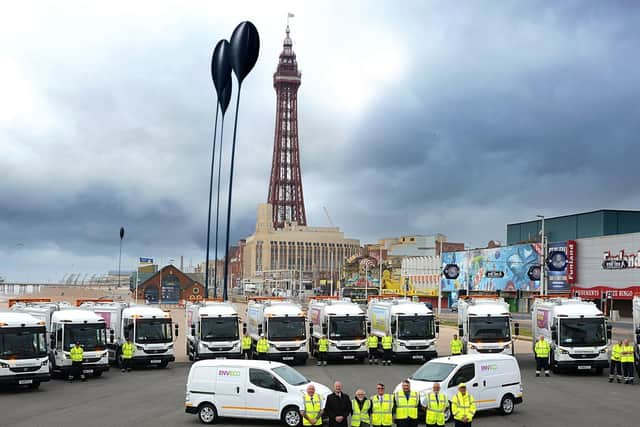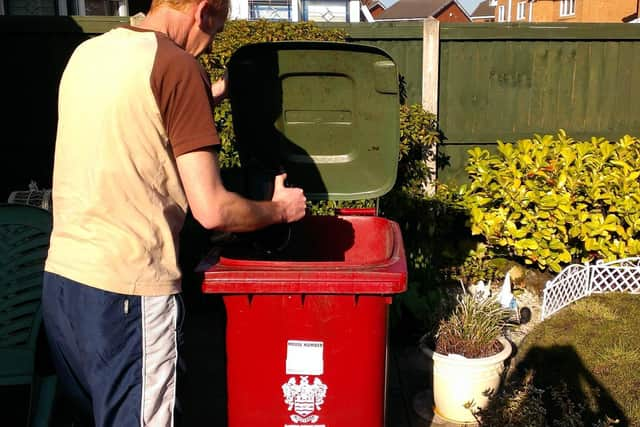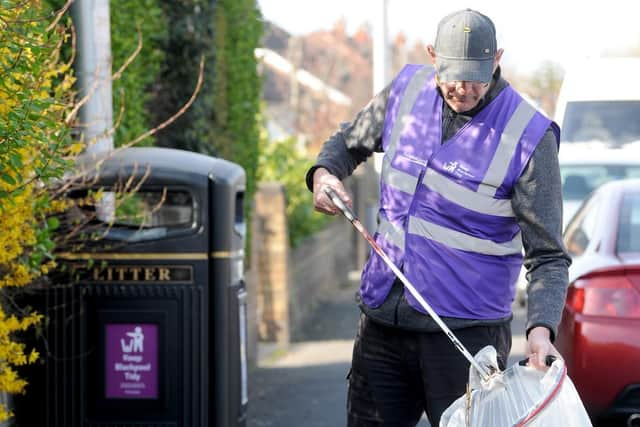From waste to weeds - how Blackpool's new refuse service is shaping up
and live on Freeview channel 276
So it's probably quite a compliment hardly anyone noticed the quiet return of our bin collections back under the wing of Blackpool Council last summer after years of being out-sourced to private operators.
It's a service which takes up a chunk of our council tax - with an annual budget of £17.3m including street cleansing.
Advertisement
Hide AdAdvertisement
Hide AdThe council decided to take it back in-house partly to make savings of £750,000 a year, but also to have more control.


A report setting out some of the achievements and the challenges the service faces was presented to the council's tourism, resources and communities scrutiny committee.
John Blackledge, director of community and environmental services at Blackpool Council, said: "Part of bringing domestic waste back in-house is about how to make efficiencies and improve the quality of what we're doing in Blackpool."
Improvements will include looking at ways of reducing the number of residents in inner neighbourhoods still reliant on plastic bin bags for their household rubbish.
Advertisement
Hide AdAdvertisement
Hide AdCoun Jim Hobson, who represents Bloomfield, said: "I don't think in this day and age we should be seeing plastic bags out on the streets and seagulls coming down and making a mess out of them."


Mr Blackledge said solutions could include providing more wheelie bins or large communal bins.
He added the council was also committed to improving recycling rates, especially around plastics, but this could only be done "in partnership with the residents and businesses of the town."
Household waste
The new company, called ENVECO and wholly owned by the council, launched on July 1 2019.


Advertisement
Hide AdAdvertisement
Hide AdIt operates out of Layton Depot where investment has included a new garage and workshop, refurbishment of existing premises, and installation of extensive CCTV monitoring.
There is a fleet of 17 new refuse vehicles fitted with the latest technology to carry out household bin collections. The move to the new company has not meant changes to when residents' bins are emptied.
The annual budget of around £17.3m is made up of £13.6m for waste services and £3.6m for street cleaning.
Blackpool has a recycling rate of 35.8 per cent according to figures from The Department for Environment, Food and Rural Affairs (Defra), but has less garden waste than most towns which affects the figures.
Advertisement
Hide AdAdvertisement
Hide AdIn 2018/19, 74 per cent of waste was diverted from landfill with almost 60 per cent re-used, recycled or composted.
The Tip Shop at the Bristol Avenue council tip has proved a success in helping keep unwanted goods out of landfill, with items refurbished for sale at the shop which last year brought in an income of almost £91,000.
Also bringing in revenue is the garden waste subscription service which now has 10,082 customers and is forecast to bring in revenue of £350,000 in the current financial year.
The council's third sector partner Calico runs the Rover mobile recycling service so people can recycle even if they do not have their own car to take rubbish to the tip.
Advertisement
Hide AdAdvertisement
Hide AdIn 2018/19 Rover picked up 71,261 items from nearly 9,000 residents.
Calico also runs the Furniture Matters Shop on Caunce Street which sells refurbished furniture and appliances.
Street cleansing
Main roads are prioritised over residential streets as the report says this is considered a more efficient use of resources.
District shopping parades are cleaned daily or alternate days depending on footfall, and litter bins are provided near shops.
Advertisement
Hide AdAdvertisement
Hide AdThe report says these policies help prevent litter blowing onto residential streets.
New bins are being provided in the town centre, particularly to tackle cigarette litter and more rubbish generated from people buying fast food.
Beach management "continues to support the vision for a blue flag coast and promote bathing water quality objectives" the report says.
Campaigns include changing people's attitudes to plastic especially due to the damage it can cause to marine life.
Advertisement
Hide AdAdvertisement
Hide AdLarger capacity bins near the beach are used during the peak summer season when staff also work longer hours to keep the Promenade clean.
The report says a national inspection system the council is part of, found the percentage of sites classed as acceptable in terms of litter was 96 per cent in Blackpool.
Council have recently been given additional powers to punish those who do drop litter and the number of fines handed out increased to 387 in 2018/19 from 302 the year before.
There are stronger powers in place to combat problems such as fly tipping and rubbish being thrown from vehicles.
Advertisement
Hide AdAdvertisement
Hide AdThe community is also getting on board with regular organised litter picks on the Promenade, Stanley Park and Houndshill Shopping Centre.
So far 318 litter pick packs have been issued to residents who voluntarily clean up their own neighbourhoods.
Keep Blackpool Tidy flags are used in busy areas such as the Promenade to get the message across to people to use bins or take their litter home.
Weeds and dog fouling
Dog dirt and weeds are often a source of gripes from residents and the council is trying to tackle the former through encouraging responsible dog ownership.
Advertisement
Hide AdAdvertisement
Hide AdDog controls were updated in 2018 in partnership with dog owners' groups, and the report says a "key objective is to actively discourage dog fouling in any public place and to actively encourage dog owners to clean up after their dogs."
The treatment of weed growth on main roads "continues to be a challenge" due to changeable weather conditions.
The report admits "the programme around residential streets followed a similar decline and became reactive to complaints only with little or no attention offered to back streets."
Modifications to mechanical sweepers has helped "but their limited deployment within residential areas remains a factor."